Censorship injunction vacated
Censorship injunction vacated
By Terry A. Hurlbut
The United States Supreme Court today effectively vacated all remaining parts of the Big Censorship Injunction in Missouri v. Biden. That is, they vacated all parts of the injunction the Fifth Circuit Court of Appeals had left in force. As in the earlier mifepristone case, the decision turned on standing. Courts never tell parties to whom they have denied standing, who would have standing instead. But clearly the only parties this Court – or rather the Moderate Bloc – will recognize as having standing, are the social media platforms themselves. One platform released a subtle gloat over this result, because it enhances their marketability to those concerned about free speech. But users everywhere understand that the Court has put them on notice: if you will not obey the Trust and Safety Team, take your activities elsewhere.
History of the censorship injunction
The case that began under the name Missouri v. Biden began in 2022. (Today it is called Murthy v. Missouri, because Vivek Murthy, the Surgeon General, was lead petitioner to the Supreme Court.) Last year – indeed on the Fourth of July itself – Judge Terry Doughty of the U.S. District Court for the Western District of Louisiana (Monroe Division) handed down a sweeping injunction against all government communications with social media platforms and their moderational authorities – which they call Trust and Safety Teams.
The federal government appealed, and eventually the Fifth Circuit Court of Appeals affirmed the District Court – but not entirely. At first they affirmed the injunction only as it applied to the:
• White House,
• Surgeon General’s Office,
• Centers for Disease Control and Prevention (CDC), and
• Federal Bureau of Investigation (FBI).
The plaintiff-appellants petitioned for an en banc rehearing – always a risky proposition in the Fifth Circuit. (They state in their rules that they frown on such petitions.) The Fifth Circuit granted the rehearing, and then affirmed the censorship injunction as to the offices named, and the Cybersecurity and Infrastructure Security Agency (CISA).
Nevertheless the federal government applied to the Supreme Court for a stay of the injunction. The Supreme Court granted the stay, treated the application as a petition for full review, then granted that review. The case came to oral argument in March.
https://rumble.com/v4ka6ar-supreme-court-divides-on-first-amendment.html?mref=4teej&mc=88ce6
Review of weaknesses in the case
CNAV said then (through the above video) and says again: the Missouri plaintiffs presented a weak argument. To begin with, someone tried to file for divided argument and for extension of time. But they filed too late, and the Court denied that motion. So the plaintiff-respondents chose J. Benjamin Aguinaga, Solicitor General of Louisiana, to argue their case. That turned out to be a fatal mistake. He conceded far too much, especially to the Liberal Bloc. By the time they got through with him, they wrung from him concessions on “compelling State interests” and “emergency powers” that attorneys for the private plaintiffs might not have offered.
Furthermore, because the case turned on standing, it was to the advantage of the Missouri plaintiffs to divide their argument. As Justice Samuel A. Alito would say in his dissent, if one plaintiff established standing, the entire case moved forward. Instead, one attorney, and that for the plaintiff having the weakest case, pleaded for all plaintiffs. They should have selected Jill Hines’ attorney to argue – for as Justice Amy Coney Barrett observed in the Opinion of the Court, Jill Hines had the strongest claim to standing of any of the plaintiffs.
But the case had another weakness, which neither Justice mentioned. This case turned on the coercion of social-media platforms. But Gab Social has from its inception defied the threats of governments everywhere. X stopped cooperating when Elon Musk bought it. On that ground alone the entire government coercion case fails.
How exactly the censorship injunction failed
The Supreme Court voted 6-3 for the government – that is, to vacate the injunction completely and remand the case. Coverage from conventional outlets might have misstated the effect of this ruling. All that has happened is that the Court refused a preliminary injunction. Judge Doughty still has time to bring this case to a full trial. No doubt the government will file a motion to dismiss on the basis of lack of standing. That’s a decision for Judge Doughty, as the trial judge, to make.
The voting fell out thus: Chief Justice John Roberts and Justices Barrett, Brett Kavanaugh, Ketanji Brown Jackson, Elena Kagan, and Sonia Sotomayor to vacate the censorship injunction, and Justices Alito, Neil Gorsuch, and Clarence Thomas to let the injunction stand. Thus the Moderates all joined the Liberals and overruled the Originalists. (More likely, Justices Barrett and Kavanaugh both voted to vacate, and Roberts simply fell in, acknowledging a fait accompli. Recall that the Chief Justice always votes last.)
Justice Barrett wrote the opinion. She carefully examined the evidence for and against standing for each plaintiff, and rejected standing for all of them. She also rejected the parens patriae theory that Missouri and Louisiana advanced, and the “right to listen” theory. As to the individual plaintiffs, she held that the pattern of censorship activities at all social-media platforms began before the government even started conversing with anyone’s Trust and Safety Teams. Therefore the plaintiffs could establish no injury to them on the government’s part.
Is that strictly true?
Justice Barrett relied on one salient common fact: all social media platforms moderate or block content on some grounds. She confined her analysis to Twitter (pre-Musk), Meta (Facebook, Instagram), and Alphabet (Google, YouTube). All have always had the most complex content guidelines of any social-media platforms. They block or restrict things like pornography and the kind of gratuitous insults people commonly call “cyberbullying.” In addition, Alphabet, Meta, and the Spotify family routinely block conservative, patriotic, and alternative-medical content, regarding it as inherently dangerous. Since Donald Trump first ran for President, these policies have become more insultingly obvious than ever.
That doesn’t matter to Justice Barrett, and presumably not to Chief Justice Roberts or Justice Kvanaugh either. What matters is whether the government ever coerced or induced these platforms to do these things. As Barrett sees it, the record does not show that yet.
The biggest issue for the Missouri plaintiffs to raise at trial (which still has not happened), is the time sequence. Barrett accepted uncritically the assertion that the Meta-Alphabet-Spotify-Twitter Axis (as it then existed) began their censorship of conservative content before the government acted. Justice Sam Alito, dissenting and writing for the Originalists, appears to dispute that notion. That, therefore, is the wedge issue for the Missouri plaintiffs to raise at trial – unless Judge Doughty dismisses the case.
Justice Alito expresses his disappointment
At oral argument, Justice Alito showed the least patience with the government, and the greatest sympathy for the plaintiffs. He showed it again in his dissent, taking great care to parse the record of injury-in-fact to Jill Hines. (Again, he and Barrett agreed that she had the strongest case for standing of any plaintiff.)
Alito held that the communications of government officials with Meta, Inc. (specifically Facebook)
possess all the hallmarks of coercion that we identified in Bantam Books [v. Sullivan] and [National Rifle Association v.] Vullo.
The Bantam case involved the publication of pornographic books. In Vullo, a New York State officer was calling banks and ordering them to debank the NRA, or else. The Court unanimously found for the NRA, and Sonia Sotomayor, as noted here, wrote the Court’s opinion in that case.
Alito drew on the Vullo case as setting forth three grounds to suspect government coercion:
(1) the authority of the government officials who are alleged to have engaged in coercion,
(2) the nature of statements made by those officials, and
(3) the reactions of the third party alleged to have been coerced.
In this case, said Alito, we deal with the highest executive authorities – the White House – making, not statements, but orders. And Facebook, at least in Jill Hines’ case, obeyed. That was enough for Alito.
Actually, Alito presented his best summary at the beginning:
This evidence was more than sufficient to establish Hines’s standing to sue,… and consequently, we are obligated to tackle the free speech issue that the case presents. The Court, however, shirks that duty and thus permits the successful campaign of coercion in this case to stand as an attractive model for future officials who want to control what the people say, hear, and think.
That is regrettable. What the officials did in this case was more subtle than the ham-handed censorship found to be unconstitutional in Vullo, but it was no less coercive. And because of the perpetrators’ high positions, it was even more dangerous. It was blatantly unconstitutional, and the country may come to regret the Court’s failure to say so. Officials who read today’s decision together with Vullo will get the message. If a coercive campaign is carried out with enough sophistication, it may get by. That is not a message this Court should send.
But was that all there was to it?
But neither Barrett nor Alito treat the two social-media platforms that blow this analysis up. Gab Social, as mentioned, never obeyed the government. Nor have they seen fit to sue over the trials and tribulations they have endured over that disobedience. Host after host disallowed them, both Google and Apple threw them off their respective “app stores,” and even the payment processors refused to deal with them. In response, Andrew Torba self-hosts on a server farm he built. He further developed a simple browser shortcut and made sure his platform would fully adapt to a mobile browser. Finally he built his own payment processor, called Gab Pay, to process payments for subscriptions and merchandise.
Elon Musk, recognizing the censorship problem at Twitter, bought the company. In this he clashed directly, not only with Twitter’s board, but also with BlackRock and Vanguard, who owned significant stakes. Today Twitter – or X as he renamed it – is a freer platform than it ever was.
But not entirely free! Musk fired eighty percent of its staff, but still has troublemakers on its Trust and Safety Team. Nevertheless the cozy relationships with the government are at an end – because Elon Musk put an end to them. Parag Agrawal and Jack Dorsey did not end the relationships because they did not want to end them. The same holds for Mark Zuckerburg at Meta, and the Three Monkeys at Alphabet. And, one presumes, their counterparts at the Spotify family.
Reaction to the censorship injunction going down
Reaction – freely expressible on X – was swift and included much weeping and gnashing of teeth.
https://x.com/LoomerReport/status/1806038627325198774
https://x.com/LoomerReport/status/1806025250704159116
https://x.com/OperDJT/status/1805968066376761691
https://x.com/kylenabecker/status/1805994126623535240
https://x.com/RepDanBishop/status/1805972658787389832
https://x.com/TrumpWarRoom/status/1805972571243892971
Andrew Torba, head of Gab, released this statement this morning, following the Court’s announcement. In the first half, Torba clearly condemned, not so much the decision, as what it now allows.
The Supreme Court’s ruling has significant implications for the ongoing debate surrounding the role of the government in regulating online speech. The Biden administration has been proactive in attempting to address the spread of what they deem to be “misinformation” on social media, particularly in relation to the COVID-19 pandemic and election integrity. This ruling bolsters the administration’s ability to continue these efforts, which may involve requesting social media platforms to remove certain posts or accounts that are deemed to be spreading what they claim to be “false information.”
But next, Torba seems to corroborate the threat of future censorship, and indicate that resistance is possible and imperative.
Since our inception in 2016, Gab has been a bastion for free speech, providing a safe haven for those who have been silenced by mainstream social media platforms. We firmly believe that the right to free speech is essential for a healthy and functioning society, and we will continue to resist any attempts by the Biden Administration to infringe upon this fundamental right.
The Biden Administration’s recent censorship requests have targeted a wide range of content, including discussions about the COVID-19 vaccine, election integrity, and criticism of government policies. These attempts to suppress dissent and control the narrative are a direct attack on the First Amendment and the values upon which our nation was founded.
Gab will not bow to these censorship demands. We will continue to stand with our users, ensuring that their voices are heard and their ideas are shared, even in the face of government pressure. As a platform committed to free speech, we believe that it is our duty to protect the rights of all Americans, regardless of their political beliefs or ideologies.
In other words:
1. Yes, the Biden administration is guilty as charged in the complaints, responses to Adm. Murthy’s petition, and at argument, and:
2. Resistance is not only “not futile” but something that everyone can do – whether that means building one’s own platform or repairing to a platform they can trust.
Andrew Torba knows he must gain people’s trust. He has made certain statements that might put off some people, particularly Jews and citizens of the State of Israel. But he pledges “to protect the rights of all Americans, regardless of their political beliefs or ideologies.” The Christian faith does not allow lying. (But recall: he gave Laura Loomer an account when no one else, except Telegram, would.)
At the same time, he might have completely vitiated the case of the Missouri plaintiffs. He has in effect told them that their best – if not only – recourse is to join his platform.
What next?
As mentioned, this ruling does not “kill” the case of Missouri v. Biden. It vacates a preliminary injunction, so the government’s bad acts may continue indefinitely. But now the case proceeds to trial – and at trial, the plaintiffs might establish a fuller and more complete record.
The House Judiciary Committee and its Weaponization Subcommittee will continue their own investigation. But if Rep. Bob Good (R-Va.) is at all correct, the people must keep calling their Representatives to make sure something beyond pretty speeches and high drama come of that investigation.
The Stanford Internet Observatory has already all but shut down. But might they start up again, under a false sense of triumph? Only time will tell.
For the moment, the social media space will divide into two distinct and parallel – therefore non-intersecting – axes:
1. The Meta-Alphabet-Spotify-Amazon Axis, which is more than willing to obey not so much the government as the Deep State, and
2. The X/Rumble/Gab Axis, with far simpler content standards, which will not give place to the government or the Deep State.
Furthermore, Rep. Dan Bishop (R-N.C.) is correct. It does fall to Congress and the President to stop these abuses. That requires a new President, and enough Congress Members having the courage to combat them. This could mean creating standing, and prosecuting Biden administration and/or Deep State officials to the fullest extent of the law.
Link to:
The article:
https://cnav.news/2024/06/26/news/censorship-injunction-vacated/
The opinion:
https://www.supremecourt.gov/opinions/23pdf/23-411_3dq3.pdf
Video: analysis of oral argument:
https://rumble.com/v4ka6ar-supreme-court-divides-on-first-amendment.html?mref=4teej&mc=88ce6
Reactions:
https://x.com/LoomerReport/status/1806038627325198774
https://x.com/LoomerReport/status/1806025250704159116
https://x.com/OperDJT/status/1805968066376761691
https://x.com/kylenabecker/status/1805994126623535240
https://x.com/RepDanBishop/status/1805972658787389832
https://x.com/TrumpWarRoom/status/1805972571243892971
Statement of Andrew Torba:
https://news.gab.com/2024/06/the-supreme-court-rules-that-biden-can-pressure-social-media-companies-to-censor/
Declarations of Truth X feed:
https://x.com/DecTruth
Declarations of Truth Locals Community:
https://declarationsoftruth.locals.com/
Conservative News and Views:
https://cnav.news/
Clixnet Media
https://clixnet.com/
-
 8:45
8:45
Future Forward
3 days agoSupreme Court Greenlights Government Censorship! Your Online Freedom at Risk?
40 -
 12:04
12:04
The Hill
3 days agoBreaking: SCOTUS Sides With Feds In Social Media CENSORSHIP Case-Huge Blow To Free Speech
197 -
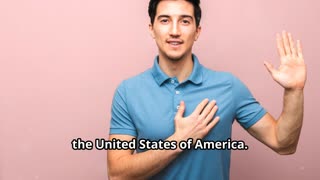 12:11
12:11
Restore the Republic One County at a Time
4 days agoHow to dismiss a Court Case with Negative Averments
2741 -
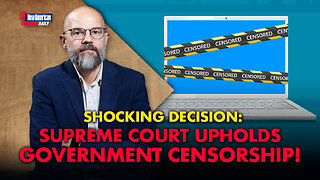 1:00:01
1:00:01
The New American Daily
3 days agoSupreme Court Upholds Covid-era Censorship
52 -
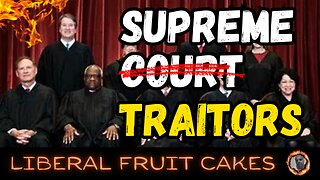 5:43
5:43
Liberal Fruit Cakes
3 days agoSupreme Court Gives Green Light to Biden White House to Censor Free Speech & Persecute Conservatives
13 -
 11:04
11:04
Restricted Republic
3 days agoIS IT ALL A SET UP! Trump Debate Trap: Arrested the Moment He Walks Off Stage!?
2.06K8 -
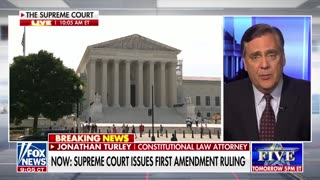 6:17
6:17
galacticstorm
3 days agoSupreme Court issues major ruling on First Amendment in social media case
2921 -
 22:06
22:06
Larry O'Connor
3 days agoSupreme Court REJECTS FREE SPEECH, Hands Biden Free Reign to CENSOR SOCIAL MEDIA!
2072 -
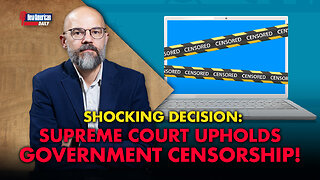 1:00:00
1:00:00
The New American
3 days agoNew American Daily | Supreme Court Upholds Covid-era Censorship
3.54K9 -
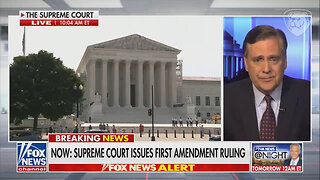 1:14
1:14
NewsVids
3 days agoThe Supreme Court Rules On Social Media Censorship Imposed By The Biden Administration
451